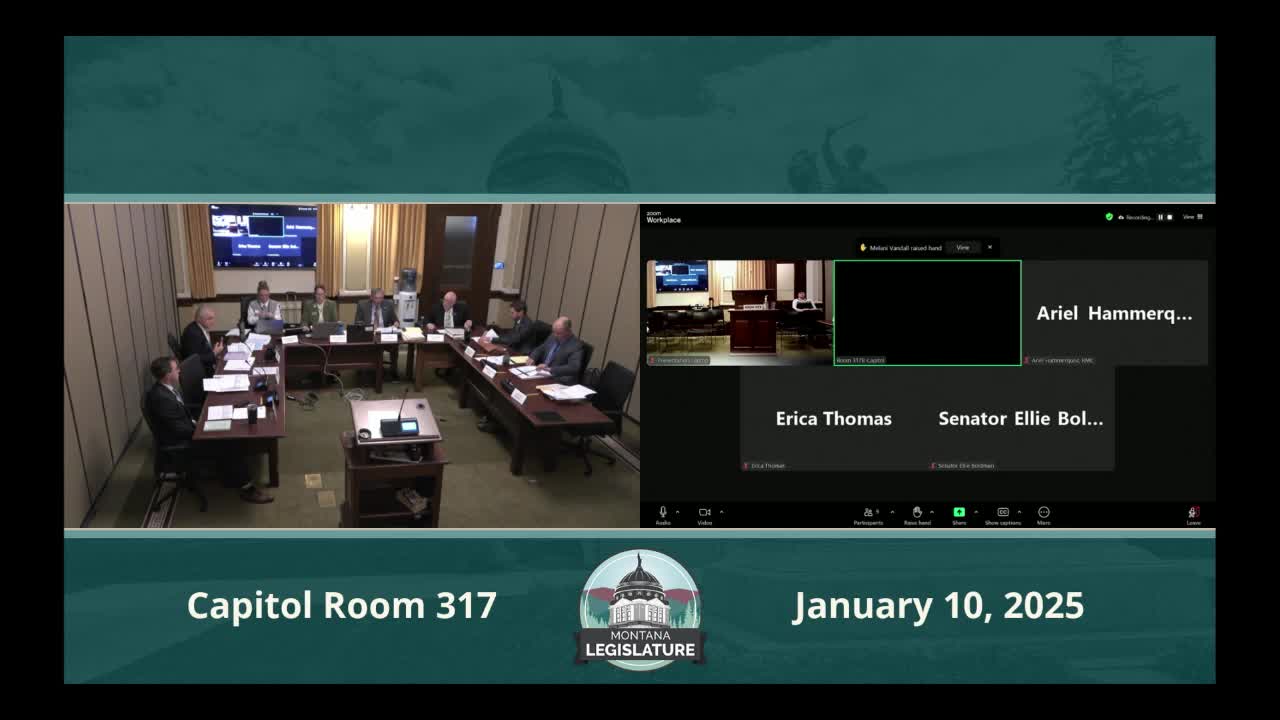Subcommittee F hears testimony on House Bill 9 Cultural Trust grant requests
Get AI-powered insights, summaries, and transcripts
Subscribe
Summary
The Montana Legislature's Subcommittee F heard testimony from more than a dozen cultural and arts organizations on grant requests tied to House Bill 9, which funds projects through the state Cultural Trust and Coal Tax Trust funds.
The Montana Legislature's Subcommittee F heard testimony from more than a dozen cultural and arts organizations on grant requests tied to House Bill 9, which funds projects through the state Cultural Trust and Coal Tax Trust funds. Witnesses described how requested funds would pay for building repairs, HVAC upgrades, programming and staff support across communities statewide.
The testimony matters because the Cultural Trust funds are a major state source for arts and heritage organizations; committee members questioned how recipients acknowledge Coal Tax funding, document spending and meet matching and reporting requirements.
Most witnesses were nonprofit leaders asking the committee to approve grant awards for specific projects and operations. Dave Schneider, board president of the Carbon County Historical Society Museum in Red Lodge, testified on behalf of grant #2624, describing persistent building needs and how an operational grant would “help us fix what breaks and pay the bills for various items in the building” for the 115‑year‑old museum. Jill Baker, executive director of Humanities Montana, urged support for grant #2635 for the speakers bureau and said, “We have a roster of over 50 trained facilitators who share vetted humanities content with audiences at little or no cost.”
Several witnesses sought capital funds for mechanical or building projects. Melanie Vandel, president of the Fort Peck Fine Arts Council in Glasgow, testified on grant #2674, a capital request she said would contribute toward modernizing the Fort Peck Theatre HVAC. Vandel said the organization had budgeted about $1,300,000 for the main HVAC project and that an initial round of bidding returned a $1,900,000 estimate, prompting a redesign and rebid. The council asked the subcommittee for a $20,000 award to support the broader campaign.
Other applicants included: - MAPS Media Institute (grant #2639) seeking operational support for media‑arts education programs serving rural and tribal youth; program director Kathy Rose Carette noted MAPS provides free workshops and year‑round programs in multiple Montana communities. - Missoula Writing Collaborative (grant #2643) seeking operational support to deliver Writers in the Schools residencies to more than 30 Western Montana schools. - Mondak Heritage Center in Sidney (grant #2644) requesting operational support for exhibits, heating and cooling and program delivery; executive director Nikki Bailey‑Wills said the center served residents of Richland, Sheridan and Dawson counties and western North Dakota and reported about 7,000 visitors last year. - Montana Shakespeare in the Parks (grant #2651) seeking operational support for touring productions and education; managing director Kerry Wintersteen confirmed public acknowledgments and program materials as places where grant recognition appears. - Yellowstone Art Museum in Billings (grant #2676) seeking capital funds to replace failing heat pumps; executive director Jessica Ruhle Ogden said, “Without this necessary infrastructure, truly nothing the Yam does is possible,” noting the museum recorded more than 17,000 visitors last year and served more than 8,500 students through education programs. - Montana Jewish Project (grant #2607) seeking staff support; executive director Rebecca Stanfeld described statewide educational programs, oral‑history projects and teacher curriculum boxes distributed to schools. - St. Timothy’s Summer Music Festival requested $5,000 over two years to underwrite one concert in each of the 2025 and 2026 seasons; board member Barbara Jane Direnfeldt said the festival draws regional audiences but is limited by a 150‑seat venue.
Committee members focused on two recurring administrative subjects: how recipients acknowledge Coal Tax/Cultural Trust funding, and how the Arts Council monitors spending and matching funds. Representative Tuss (Representative Tuss) asked whether recipients visibly acknowledge the trust; Kristen Burgoyne, deputy director of the Montana Arts Council, said the council requires an acknowledgment and tracks it in final reports and that “If you look at the actual text of house bill 9 you can see what language is required.” Burgoyne confirmed the Arts Council collects screenshots or program images as evidence in grantees’ final reports.
Representative Vinton (Representative Vinton) and others pressed on capital project oversight and auditability. Burgoyne and a council staff member identified a statutory and program framework: capital awards are subject to a required matching ratio (described by the Arts Council as a 3‑to‑1 match for capital expenditures), a limit that no more than 25% of total awards go to capital expenditures, and periodic reporting (6‑month updates and a final report) that the Arts Council uses to track actual spending versus budgets submitted with applications. The chair asked the Arts Council to provide committee members a blank copy of the grant contract and reporting templates for review.
No formal votes were taken during this hearing; the subcommittee recessed with plans to resume consideration of additional witnesses on Monday, when staff said about 20 more applicants were scheduled to testify.
The hearing record includes multiple grant application numbers and project descriptions that the committee will use in its budget review; committee staff and the Arts Council indicated they will return documentation and sample contracts to the committee before further action.
